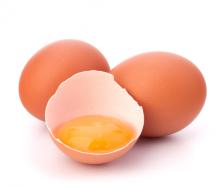Which Eggs are Best?
Are some eggs more nutritious than others?
 Which Eggs Are Best?
Which Eggs Are Best?
It used to be that the only decision you had to make when buying eggs was whether to buy large, extra large, or jumbo. Now, you also have your choice of free-range, cage-free, organic, and eggs with extra omega-3 fats. What kind of eggs are best? It depends on what you’re after.
For more up-to-date information on healthy eating, check out my new guidebook, Nutrition Diva’s Secrets for a Healthy Diet. Read a free chapter here.
What Do “Free Range” and “Cage Free” Mean?
First, let’s talk about the terms “free-range” and “cage-free.” When you see these words on egg cartons, you probably picture chickens pecking around a grassy farm-yard, with a picturesque red barn in the background and a friendly cow named Bessie looking over the fence. However, there are no standards for the use of these terms with regard to eggs. Chickens that produce so-called free-range and cage-free eggs may in fact never see the light of day much less a blade of grass.
The focus of today’s discussion is really the nutritional aspect of the eggs and I don’t want to get too far off-topic. But if you’re concerned about the welfare and living conditions of the birds that lay your eggs, you can’t rely on packaging claims. You need to contact the producers and ask for specifics. Generally speaking, farmers who are raising their animals the way that you’d probably hope they are, are very eager to give you all the details.
How chickens live affects their health and welfare, of course, but it’s what they eat that has the biggest impact on the nutritional quality of their eggs. The two are not necessarily related.
Are Organic Eggs Better?
Organic eggs come from chickens that are given only organic feed which has not been treated with pesticides. They are also not treated with antibiotics. And chickens are never treated with hormones, as I discussed in this recent article. For the reasons that I outline in these articles, reducing the use of pesticides, antibiotics, and hormones in agriculture is definitely good for animals, good for the environment, and ultimately good for humans. But, again, these factors don’t necessarily impact the nutritional quality of eggs.
What Makes Eggs More Nutritious?
There are two ways to improve the nutritional quality of eggs. One is to give the chickens access to pasture, where they can eat green plants and insects. That increases the amount of beta-carotene, vitamin D, E, and omega-3 fatty acids in the eggs. All of these particular nutrients, by the way, are found in the yolks. The chicken’s diet doesn’t really affect the egg whites, which are primarily protein. Also, be aware that the nutritional content, appearance, and flavor of eggs from pastured hens varies with the season, as the flora and fauna of the pasture changes.
I should point out that pastured chickens are not necessarily organic and organic chickens are not necessarily pastured. Organic chickens may be fed organic chicken feed but never allowed to graze open pasture. Conversely, pastured chickens may or may not be grazing on land that’s been certified organic.
More Nutritious Chicken Feed Makes More Nutritious Eggs
The other way to improve the nutritional quality of the eggs is to fortify the chicken feed with nutrients that you’d like to see in the eggs. Eggland’s Best produces eggs that are higher in Omega-3 fatty acids and vitamin E, for example, by adding flaxseed to the chicken feed. Any type of chicken, whether pastured, organic, both, or neither, may be given feed that’s been fortified with additional nutrients like omega-3s or vitamin E.
Quick and Dirty Tips on Which Eggs are Best
It’s all a little confusing, I’ll grant you. But now that I’ve given a little background on what all these terms do and don’t mean, here are my quick and dirty tips about eggs.
-
Terms like “cage-free” and “free-range” don’t tell you much about how the animals are being raised. If animal welfare is a concern, you need to do some research on your farmer.
-
Buying organic eggs helps keep pesticides and antibiotics out of farmyards and the larger environment—but doesn’t necessarily get you more nutritious eggs.
-
Pastured and omega-3 fortified eggs offer some nutritional advantages—although I’d like to point out that regular old eggs are still very nutritious.
Keep in Touch
If you have a suggestion for a future show topic send an email to nutrition@quickanddirtytips.comcreate new email or leave me a voice mail at 206-203-1438. You can also post comments and questions on my Nutrition Diva Facebook Page or on Twitter. I answer a lot of listener questions in my free weekly newsletter, so if you’ve sent a question my way, be sure you’re signed up to receive that.
Have a great week and remember to eat something good for me!
RESOURCES:
What egg labels tell you about animal welfare (Humane Society)
Requirements for organic certification of eggs (About.com:Green Living)
Omega-3 enriched eggs (Canadian Egg Marketing Association)
Salmonella risk from organic eggs (NutritionData.com)
Eggs image courtesy of Shutterstock


 Which Eggs Are Best?
Which Eggs Are Best?